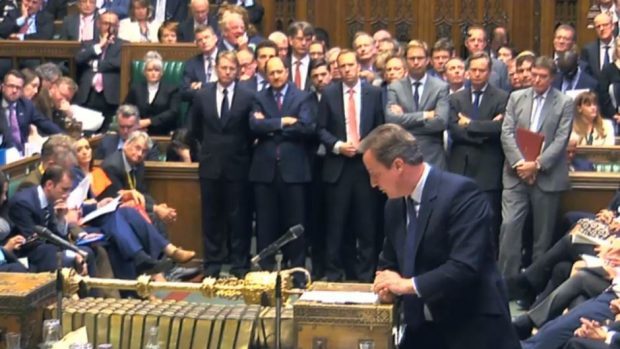David Cameron has insisted the UK must not turn its back on Europe or the rest of the world in the aftermath of the nation’s vote to leave the EU.
The prime minister called on the country to “hold fast” to a vision of an outward-looking UK that is “respected abroad” and “tolerant at home”.
And he spoke out against the incidents of hate crime that have surfaced in the days after the referendum, adding: “We have a fundamental responsibility to bring our country together.”
Addressing the Commons yesterday, for the first time since the poll, he also seized the opportunity to warn European leaders the UK would not be rushed into withdrawal negotiations.
SNP Westminster Leader Angus Robertson told the PM that Scotland would not be part of a “diminished little Britain”.
The Moray MP said there would be a second independence referendum to protect Scotland’s place in the EU if necessary.
While the overall result last week was for a Brexit, every single local authority area north of the border voted for the UK to remain in the EU.
Mr Robertson added: “It really, really matters to us that we live in an outward-looking country, not a diminished little Britain.
“Let me tell this House and our friends across Europe – we have no intention whatsoever of seeing Scotland taken out of Europe.
“That would be totally, totally democratically unacceptable.
“We are a European country and we will stay a European country and if that means we have to have an independence referendum to protect Scotland’s place then so be it.”
Mr Cameron said Scotland had benefited from being in two single markets, the UK and Europe, adding: “In my view the best outcome is to try and keep Scotland in both.”
He also reiterated his pledge to “fully involve” the Scottish, Welsh and Northern Ireland governments as the UK prepares for its negotiation with the EU.
The prime minister said he stood by what he had said about the risks of leaving the EU, but insisted there could be no doubt about the result, which must be accepted and implemented.
Condemning a graffiti attack on a Polish community centre and verbal abuse against ethnic minorities, Mr Cameron went on: “We will not stand for hate crime or these kinds of attacks. They must be stamped out.”
He also sought to reassure European citizens living in the UK and Brits in European countries that there would be no immediate change in their circumstances.
Echoing Chancellor George Osborne’s speech early yesterday – his first appearance since the referendum – the PM acknowledged the volatile economic reaction and accepted it would “far from plain sailing”.
But he highlighted contingency plans put together by the Treasury and Bank of England, adding: “We should take confidence from the fact that Britain is ready to confront what the future holds for us from a position of strength.”
Meanwhile, a Civil Service unit to prepare for negotiating the UK’s exit from the EU is also being set up, bringing together officials from across Whitehall.
Mr Cameron will attend a European Council meeting today ahead of which he has already discussed with European leaders the fact the UK Government will not be triggering the two-year exit period at this stage.
He said the gathering would be a chance to make the point that “Britain is leaving the EU, but we must not turn our back on Europe – or on the rest of the world”.
He concluded: “I believe we should hold fast to a vision of Britain that wants to be respected abroad, tolerant at home, engaged in the world and working with our international partners to advance the prosperity and security of our nation for generations to come.”
